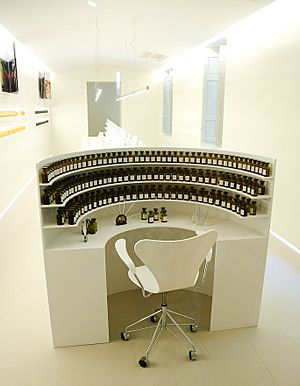Perfumer facts for kids
A perfumer is like a scent artist or a "nose" who creates amazing perfumes. They are experts at understanding and mixing many different fragrance ingredients. A perfumer needs to know how each ingredient smells on its own and how it changes when mixed with other scents. They combine these smells to create unique and beautiful new fragrances.
Contents
What Does a Perfumer Do?
Perfumers spend a lot of time learning about thousands of natural and man-made smells. They can identify specific scents even when they are part of a complex mixture. This skill is very important for creating new perfumes or recreating classic ones.
Learning the Art of Scent
Becoming a perfumer takes many years of training. It's not just about having a good nose; it's also about creativity and scientific knowledge. Perfumers study chemistry to understand how different molecules create smells. They also learn about the history of perfumes and what scents are popular in different cultures.
Where Do Perfumers Work?
Perfumers often work for large fragrance companies that create scents for perfumes, soaps, candles, and even food. Some perfumers work independently, creating custom fragrances for clients or their own perfume brands. Their workplaces, sometimes called "perfume organs," have hundreds of small bottles filled with different scent ingredients.
The Creative Process of Perfumery
Creating a new perfume is a lot like composing music. A perfumer chooses different scent notes to build a fragrance.
- Top notes are the first smells you notice. They are light and fresh, like citrus or herbs, but they fade quickly.
- Middle notes (or heart notes) appear after the top notes fade. These are usually floral or spicy scents that give the perfume its main character.
- Base notes are the deepest and longest-lasting smells. They are rich and warm, like vanilla, wood, or musk, and they help the perfume stay on your skin for hours.
Perfumers carefully blend these notes to create a balanced and pleasing scent that tells a story or evokes a feeling.
History of Perfumery
The art of making perfumes is very old. People have been using fragrances for thousands of years.
Ancient Origins of Fragrance
Ancient Egyptians used scented oils and resins in religious ceremonies and for personal hygiene. The Romans and Greeks also used perfumes for bathing and in public spaces. Early perfumes were often made from natural ingredients like flowers, herbs, and spices.
Modern Perfumery Develops
Modern perfumery, as we know it today, began to develop in the 17th century in France. Grasse, a town in France, became a major center for growing flowers and producing fragrance ingredients. This led to the creation of many famous perfume houses. Over time, new scientific methods allowed perfumers to create even more complex and long-lasting scents.
See also
 In Spanish: Perfumista para niños
In Spanish: Perfumista para niños
 | William M. Jackson |
 | Juan E. Gilbert |
 | Neil deGrasse Tyson |


